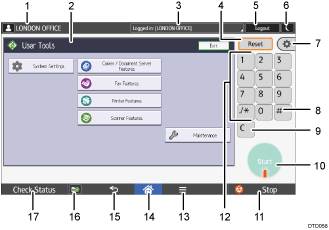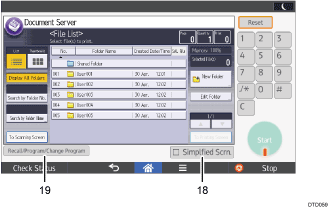You can open the function screens by pressing icons such as [Copier] or [Fax] on the Home screen 4.
Function icons and operation keys are displayed on the screen.
The initial settings screen

Applications' screen

The name of the user who is logged in
Displays the name of the user currently logging in to the machine. The name of the user is displayed only when user authentication is enabled.
Function screen
Each function has a different screen. See How to Use the Screens on the Control Panel.
System message
Displays messages from the machine system and applications.
[Reset]
Press to clear the current settings.
[Login]/[Logout]
These keys are displayed when user authentication is enabled. When you press [Login], the authentication screen appears. If you have been already logged in to the machine, [Logout] appears. To log out of the machine, press [Logout].
For details about how to log in and out, see Logging In the Machine.
[Energy Saver]

Press to switch to and from Sleep mode.
For details about the modes, see Saving Energy.
[User Tools]
Screen Features
Press to customize the default settings of the operating system installed on the control panel. See "Screen Features", Connecting the Machine/ System Settings.
Machine Features
Press to customize the default settings of the machine system. You can also customize the default settings of the copier, Document Server, facsimile, printer, and scanner function. See "Accessing User Tools", Connecting the Machine/ System Settings.
Counter
Press to check or print the counter value. See Counter.
Inquiry
Press to find out where to order expendable supplies and where to call when a malfunction occurs.
Address Book Management
Press to display the Address Book.
Tray Paper Settings
Press to make settings for paper trays and paper status.
[
 ] (Enter)
] (Enter)Press to confirm values entered or items specified.
[Clear]
Press to delete a number entered.
[Start]
Press to start copying, printing, scanning, or sending.
[Stop]
Press to stop a job in progress, such as copying, scanning, faxing, or printing.
Number keys
Use to enter the numbers for copies, fax numbers and data for the selected function.
[Menu]

Displays the menu screen of the application you are using. Depending on the application you are using, this key may be disabled. You can also press this key in the [Home] screen to restore the [Home] screen's settings to their defaults.
[Home]

Press to display the [Home] screen. For details, see How to Use the [Home] Screen.
[Return]

Press this key to return to the previous screen while Screen Features are enabled or applications are used. Depending on the application you are using, this key may be disabled. You can specify whether this key is enabled or not in some applications. For details about the settings, see "Screen Features", Connecting the Machine/ System Settings.
[Media Information]
 /
/
Press to remove the inserted SD card or USB flash memory device from the media slot. For details, see Removing an SD Card or Removing a USB Flash Memory Device.
[Check Status]
Press to check the machine's system status, operational status of each function, and current jobs. You can also display the job history and the machine's maintenance information.
[Simplfied Scrn.]
Press to switch to the simple screen. See Switching Screen Patterns.
[Recall/Program/Change Program]
Press to register frequently used settings, or to recall registered settings. See Registering Frequently Used Functions.
